Missed Climate Goal for 2020: Time to Rethink Climate Policy?
ifo Institut, München, 2018
ifo Schnelldienst, 2018, 71, Nr. 01, 03-25

New calculations by the Germany Federal Ministry for the Environment show that Germany will probably fall a long way short of its climate targets for 2020. How should climate policy be reformulated and which incentive systems are necessary for an effective climate policy that makes economic sense? Claudia Kemfert, German Advisory Council on the Environment and DIW, highlights the need for a quick switch in the energy and transport sectors. A fast phase-out of coal is needed to at least bring Germany closer to its emission reduction targets. Further progress also needs to be made in expanding renewable energies and a sustainable turnaround in transport needs to be initiated. To achieve this it is necessary to implement a reform and benefits with a view to raising taxes on fossil fuels and lowering those on renewable energies. Kemfert also argues in favour of introducing an admission quota for electric drives, ambitious thresholds and fiscal incentives to improve vehicle efficiency, as well as road tolls based on distance travelled. According to Erik Gawel, University of Leipzig and Helmholtz Zentrum für Umweltforschung – UFZ, Leipzig, climate policy in Germany needs a structural reboot. This primarily calls for a social consensus on the need for stringent climate protection and the recovery of a climate policy consensus at the EU level. The unsatisfactory results of climate protection policy and its disparate form reflected these basic social deficits and could not be remedied with individual measures. Manfred Fischedick, Wuppertal Institut für Klima, Umwelt, Energie, believes that it is possible to return to a successful climate policy. To find suitable ways of doing so, the dialogue with key stakeholders needs to be continued and embedded in a broader social-policy discourse. Serious discussion is needed of how a path can be found leading to greenhouse gas neutrality in every sector. At an international level there should also be more alliances involving cooperation in implementation. Marc Oliver Bettzüge, University of Cologne, suggests structuring the national climate goals for 2020 according to the division stipulated by the EU of ETS and non-ETS sectors. The size of the overall target is the sum of the two sub-goals for the ETS sector on the one hand, and for the non-ETS sector on the other. A revision of Germany's climate targets that systematically differentiates between ETS and non-ETS sectors would bring the measures required to achieve them into sharper focus. While attention should primarily be focused on tax measures in the non-ETS sectors, in Germany's ETS sectors it is a question of suitable complements to the EU regulation on ETS, as well as a far-reaching reform of the payment system for electricity. Felix Chr. Matthes, Öko-Institut, Berlin, assumes that the policy priorities pursued in regulations and investment financing in recent years need to be supplemented in several areas at the very least. A first priority action item would be to take a more stringent approach to CO2 pricing. In his view, the system of explicit and implicit CO2 pricing in Germany– and in the European Union – is neither sufficiently effective or consistent. Secondly, there is the challenge of how transformation in the transport sector can be accelerated. In the short and middle term there is no way around the market introduction of electric vehicles. Andreas Kuhlmann, Deutsche Energie-Agentur (dena), writes that the present regulatory and legislative framework is far too old and rigid, over-complex and deters innovation. This is unsurprising since it is primarily based on circumstances and a target description dating from the early 2000s, when renewable energies had to be taken "out of a niche". Digitalisation was still almost unheard of at that time and the amazing cost reductions offered by various technologies were not yet apparent. Germany could cut its CO2 emissions by up to 90% through 2050, if the technologies known to us today were to be optimally used in a transformation path. This would mean consistently designing energy industry framework conditions so that climate protection technologies could prove themselves competitive in a free market. New approaches are needed to rethink climate policy. These approaches need to remain open to future developments and should not stipulate everything from the outset and obstruct entire technology paths in the process.